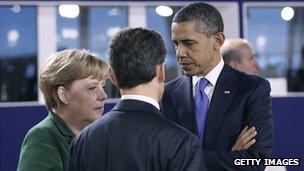Euro crisis leaves US howling into the wind
- Published
- comments

The trans-Atlantic relationship is no laughing matter
Financiers in New York and politicians in Washington look on aghast as a hurricane moves across Europe, toppling leaders and ripping up the roots of recovery.
They feel Europe's leaders don't see the big picture, can't join the dots and aren't thinking big.
Above all, they fear they will reap the whirlwind when the storm crosses the Atlantic.
US Treasury Secretary Tim Geithner has said, external: "It is crucial that Europe move quickly."
President Barack Obama may have been more direct when he spoke privately to German Chancellor Angela Merkel and French President Nicolas Sarkozy.
"It's dramatic," the managing director of a big global finance firm told me. The boss, who didn't want to be named went on.
"The lack of unity, the lack of credibility coming out of Europe is disheartening. Spain and France are now starting to weaken."
Is it going to get worse? "You betcha. It's crazy."
Curveballs
The White House would not be quite so blunt. At least not in public. But there is deep frustration that for months their message has been ignored.
One source reminded me that for 35 years the White House has wanted a single phone number for Europe, externalLink, external. Now it has one, they continued, and it is Angela Merkel's. But the Americans feel that while she is taking their calls, she is not really listening.
There's a joke in Washington: Who could defeat Obama next year? Angela Merkel.
OK, it is a think-tank type of joke and isn't very funny. But you get the point. Those who tell it believe if Germany doesn't take fierce action, Europe will go into recession, the US will follow and Barack Obama hasn't a prayer of being re-elected.
The frustration in Washington is that Europe's leaders not only don't seem able to get ahead of the curve, they don't even seem to understand the concept.
It seems obvious to the administration that big, bold, dramatic action is needed. In other words Germany has to come up with not just enough money to stave off a crisis for a week, but so much that it surprises and impresses the markets.
Oh, and a stimulus package to get growth going again would be nice, too.
New recession fears
If that doesn't happen Washington cannot bear to think of what might.
There is quite a debate about the risk to American banks. Certainly Greece wasn't much of a problem. But Italy is much more worrying.
Back in the summer, Mr Geithner said the exposure to Europe as a whole, external was "quite small".
But Congress has been told, external it is 5% of total banking assets, some $640bn (£402bn). There are indications that fear of the euro disaster has already stopped banks lending.
But the worry is bigger, if less specific. It is simply that a recession in Europe is almost inevitable and that will push America back into recession.
Thomas Kleine-Brockhoff, director of strategy at the German Marshall Fund of the United States, says there is not just a eurozone crisis, but a "bi-continental crisis" because of the "deep integration" of the two economies. He says confidence is being hit right now because business fear "unknown avenues of contagion".
The European Commission says, external the EU and the US "enjoy the most integrated economic relationship in the world, illustrated by unrivalled levels of mutual investment stocks, reaching over 2.1tn euros".
But "enjoy" may not be the right word right now. Domenico Lombardi of the Brookings Institution already sees tell-tale signs of American exports suffering.
"Exports to Europe may slow down significantly in the next few months following the recession Europe is dipping into. In Indianapolis, a hub for US pharmaceutical exports to Europe, the industry has already suffered three consecutive quarters of double-digit job losses."
These are just straws in a growing wind.
There is a sense in the US that they are howling into the storm, urgently shouting advice while the immediate victims blithely and calmly do to little to escape the catastrophe that is about to over take them.
Their horror grows with every passing moment because of their certainty that if they're ignored, they're next.